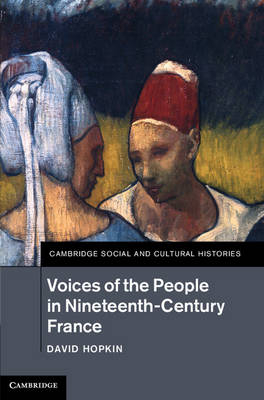
Voices of the People in Nineteenth-Century France
Seiten
2012
Cambridge University Press (Verlag)
978-0-521-51936-6 (ISBN)
Cambridge University Press (Verlag)
978-0-521-51936-6 (ISBN)
This innovative study of the lives of ordinary people – peasants, fishermen, textile workers - in nineteenth-century France demonstrates how folklore collections can be used to shed new light on the socially marginalized, and reveals how oral culture provided mechanisms for the poor to assert some control over their own destinies.
This innovative study of the lives of ordinary people – peasants, fishermen, textile workers – in nineteenth-century France demonstrates how folklore collections can be used to shed new light on the socially marginalized. David Hopkin explores the ways in which people used traditional genres such as stories, songs and riddles to highlight problems in their daily lives and give vent to their desires without undermining the two key institutions of their social world – the family and the community. The book addresses recognized problems in social history such as the division of power within the peasant family, the maintenance of communal bonds in competitive environments, and marriage strategies in unequal societies, showing how social and cultural history can be reconnected through the study of individual voices recorded by folklorists. Above all, it reveals how oral culture provided mechanisms for the poor to assert some control over their own destinies.
This innovative study of the lives of ordinary people – peasants, fishermen, textile workers – in nineteenth-century France demonstrates how folklore collections can be used to shed new light on the socially marginalized. David Hopkin explores the ways in which people used traditional genres such as stories, songs and riddles to highlight problems in their daily lives and give vent to their desires without undermining the two key institutions of their social world – the family and the community. The book addresses recognized problems in social history such as the division of power within the peasant family, the maintenance of communal bonds in competitive environments, and marriage strategies in unequal societies, showing how social and cultural history can be reconnected through the study of individual voices recorded by folklorists. Above all, it reveals how oral culture provided mechanisms for the poor to assert some control over their own destinies.
David Hopkin is Fellow and Tutor in History at Hertford College, Oxford. His research concentrates on the oral and popular cultures of nineteenth-century Europe. He is editor of the journal Cultural and Social History.
Introduction: folklore and the historian; 1. Storytelling in a maritime community: Saint-Cast, 1879–82; 2. The sailor's tale: storytelling on board the North Atlantic fishing fleet; 3. Love riddles and family strategies: the Dâyemans of Lorraine; 4. Storytelling and family dynamics in an extended household: the Briffaults of Montigny-aux-Amognes; 5. Work songs and peasant visions of the social order; 6. The visionary world of the Vellave lacemaker; Conclusion: between the micro and the macro; Bibliography.
| Reihe/Serie | Cambridge Social and Cultural Histories |
|---|---|
| Zusatzinfo | 3 Maps; 2 Halftones, black and white; 1 Line drawings, black and white |
| Verlagsort | Cambridge |
| Sprache | englisch |
| Maße | 159 x 234 mm |
| Gewicht | 640 g |
| Themenwelt | Geschichte ► Allgemeine Geschichte ► Neuzeit (bis 1918) |
| Geisteswissenschaften ► Geschichte ► Regional- / Ländergeschichte | |
| Geschichte ► Teilgebiete der Geschichte ► Kulturgeschichte | |
| Geschichte ► Teilgebiete der Geschichte ► Sozialgeschichte | |
| Sozialwissenschaften ► Soziologie | |
| ISBN-10 | 0-521-51936-5 / 0521519365 |
| ISBN-13 | 978-0-521-51936-6 / 9780521519366 |
| Zustand | Neuware |
| Haben Sie eine Frage zum Produkt? |
Mehr entdecken
aus dem Bereich
aus dem Bereich
Europa 1848/49 und der Kampf für eine neue Welt
Buch | Hardcover (2023)
DVA (Verlag)
48,00 €
Giordano Bruno - ein ketzerisches Leben
Buch | Hardcover (2024)
C.H.Beck (Verlag)
29,90 €


